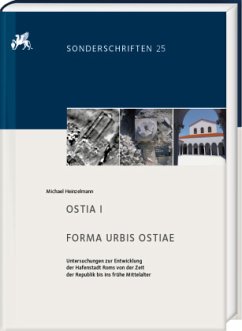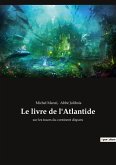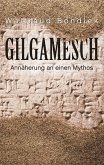Von 1996 bis 2001 führte das Deutsche Archäologische Institut Rom in Kooperation mit der American Academy in Rome und mit Unterstützung der Soprintendenza Archeologica di Ostia ein interdisziplinäres Feldforschungsprojekt in den noch nicht ausgegrabenen Bereichen der Hafenstadt Roms durch. Ziel war es, mithilfe einer Kombination von nicht-invasiven Untersuchungsmethoden (Luftbildanalyse, geophysikalische Prospektionen) und gezielten stratigraphischen Ausgrabungen neue Erkenntnisse zur städtebaulichen Gesamtstruktur Ostias und seiner langfristigen Entwicklung von der Gründung im 4. Jahrhundert v.Chr. bis zur Aufgabe im frühen Mittelalter zu gewinnen. Im ersten Band der Projektpublikation werden die Ergebnisse und die Dokumentation der stratigraphischen Ausgrabungen in den Regionen III, IV und V vorgelegt. Einen Schwerpunkt bildete die Untersuchung von Straßen, der Stadtmauer und ausgewählter Wohngebäude (Domus, Insulae, suburbane Villa) und Wirtschaftsbauten (Tabernae, Horrea), die jeweils in ihrer langfristigen Entwicklung betrachtet werden. Ferner konzentrierten sich die Arbeiten auf die neu entdeckte konstantinische Bischofskirche mit verschiedenen Vorgängerbauten sowie auf das Hafenbecken im Westen, das von einem monumentalen Tempel-Navalia-Komplex flankiert wurde. Die zahlreich gewonnenen Einzelerkenntnisse liefern in der Gesamtschau wichtige Hinweise für eine Neubewertung der städtebaulichen und wirtschaftlichen Entwicklung Ostias, die - verbunden mit den Ergebnissen der Luftbildanalysen und geophysikalischen Prospektionen - im zweiten Band diskutiert werden soll.From 1996 to 2001, the German Archaeological Institute in Rome in cooperation with the American Academy in Rome and with the support of the Soprintendenza Archeologica di Ostia carried out an interdisciplinary field research project in the not yet excavated parts of Rome's seaport. Using a combination of non-invasive investigative methods (aerial photo analysis, geophysical prospecting) and targeted stratigraphic excavations, the project sought to acquire new insights into Ostia's overall urban structure and its long-term evolution from its founding in the 4th century B.C. to its abandonment in the early Middle Ages. Extensive material analyses were carried out in addition, as were - between 2012 and 2016 - targeted geoarchaeological explorations in a newly discovered laguna harbor in the west of the urban area and along the ancient course of the Tiber. This volume, the first to be published on this project, presents the results and the documentation of the stratigraphic excavations in the Regions III, IV and V. They followed various lines of inquiry. One focus was the investigation of streets, the city wall, selected houses (domus, insulae, suburban villa) and service buildings (tabernae, horrea), which were observed in their long-term development. Beyond that, work concentrated on the newly discovered Constantine episcopal church with various predecessor buildings and also on the western dock that was flanked by a monumental temple-navalia complex. The numerous data obtained, when viewed together, provide important indications for a re-evaluation of Ostia's urban and economic development - a topic that will be dealt with in volume two, combined with the results of the aerial photo analysis and geophysical prospecting.
Bitte wählen Sie Ihr Anliegen aus.
Rechnungen
Retourenschein anfordern
Bestellstatus
Storno








